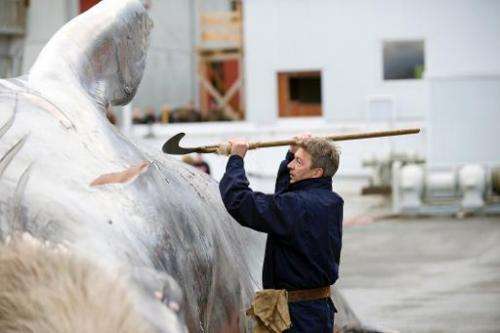Japan imports tonnes of whale meat from Iceland, Greenpeace says

Environmentalists on Friday lashed out after Japan imported 2,000 tonnes of frozen whale meat from Iceland, in what they say is continued defiance of world opinion over the hunting of the mammals.
Packages containing meat from fin whales were unloaded Thursday from a vessel that had travelled from Iceland to Osaka, western Japan, said Junichi Sato of Greenpeace Japan.
The ship left Iceland in March carrying a cargo equivalent to almost all the whale meat imports from the north European country for the last six years, environment groups and news reports said.
An official at the port in Osaka confirmed the arrival of the ship.
"The ship, named Alma, arrived on May 7 and we were informed in advance that it would carry whale meat to be unloaded at Osaka port," he told AFP.
Greenpeace said it was puzzled by the size of the cargo.
"We don't know why Japan had to import such a huge volume of whale meat," accounting for about two thirds of the nation's annual consumption, Sato said.
"No matter what, we oppose such shipments," he added.
In December, Iceland said it had increased its 2014 quotas for whaling in a move likely to intensify international condemnation of the practice.

Since it resumed whaling in 2006 despite an international moratorium, Iceland, along with Norway, has come in for furious criticism from environmental groups and some other countries.
Icelanders eat little whale meat, and most of the catch is sent to the Japanese market.
Japan also hunts whales, but qualifies the activity as scientific research, even though whale meat finds its way to its restaurants.
In March, the United Nations' top court ruled the annual mission to the Southern Ocean by Japanese whaling vessels was a commercial hunt masquerading as science to skirt the international ban.
Tokyo said there would be no hunting in the Southern Ocean in the 2014-15 season, but vessels would be there to carry out "non-lethal research". However, the announcement raised the possibility that harpoon ships would return the following year.
That would put Japan on a collision course with anti-whaling nations like Australia, which brought the case to the International Court of Justice.
Although not difficult to find in Japan, whale meat is not a regular part of most Japanese people's diet.
Vessels involved in Japan's permitted coastal whaling programme and in its "scientific" hunt in the Pacific Ocean left harbour last month.
Supporters argue that the hunting and eating of whale is part of Japan's culture and complain of double standards from anti-whaling nations with large beef industries.
But critics say Tokyo's position is influenced more by a desire to support vested interests in the whaling industry than to protect a source of food that is no longer widely consumed.
They claim the country has large stocks of frozen whale meat from its own hunts that it cannot sell because there is insufficient demand.
© 2014 AFP



















